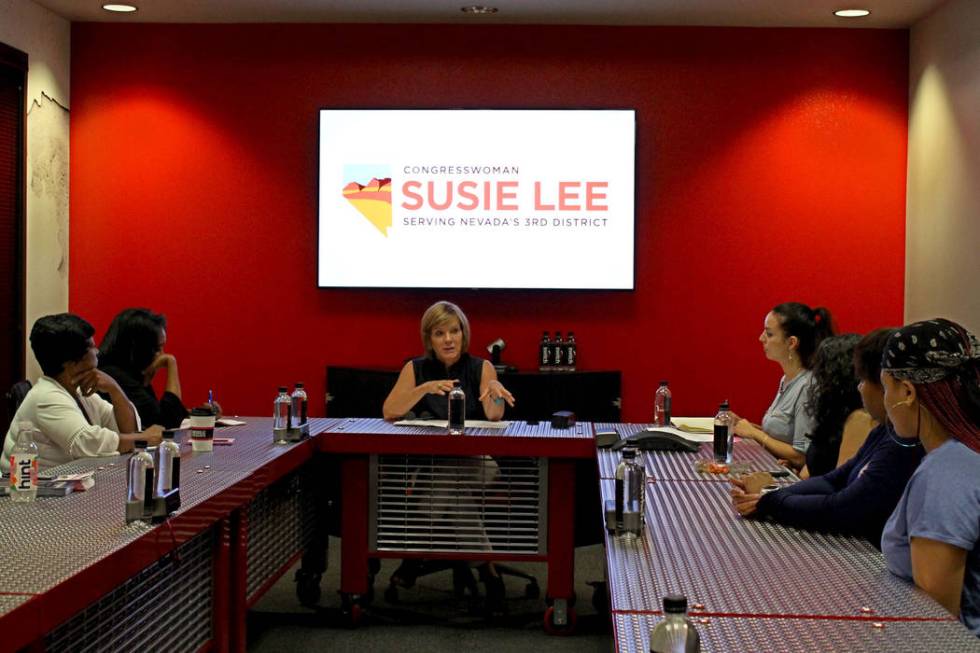Women veterans open up to lawmaker at Las Vegas event

After an hourlong conversation with a handful of women veterans Saturday afternoon, U.S. Rep. Susie Lee said she had “ideas swirling around” for what she could do for them in Congress.
She did have one pledge for them, at least locally.
“A lot of women don’t identify as veterans, so it’s about making sure that we’re doing what we can to let them understand that they’re eligible for benefits and there’s a community out there,” Lee said.
“That’s a big issue when you look at suicide prevention. It’s about resources.”
For an hour at Switch’s Innevation Center in Las Vegas, the freshman Democratic representative who also sits on the Veterans Affairs Committee, listened to a group of women veterans as they rattled off issues surrounding the G.I. Bill, employment, military sexual trauma and women veteran outreach.
Luisa Pacheco, who served five years in the Navy, said she had no idea what benefits and health care she was eligible to receive after separating, even after attending the Navy’s Transition Assistance Program. Since then, she said, she has struggled with securing a livable wage.
Marie Holcomb, a 14-year Navy veteran who is a veterans service officer with the Nevada Department of Veterans Services, said her experience with the transition program was helpful. She was provided information on what benefits she was eligible for immediately after separating.
“There’s jobs out there, you just have to find the connections,” she told Pacheco. “We’re working on revamping our women’s outreach to be more in tune with what women veterans need in Nevada.”
Donna Lee, a 20-year Navy and Vietnam-era veteran, said there are self-esteem barriers for women veterans when seeking benefits.
“I work with a lot of veterans. … For whatever reason, a lot of them are not willing to admit they’re a veteran, or to show that they have pride in being a veteran,” she said. “When you say veteran, they think that’s somebody that’s disabled or retired.”
For the congresswoman, the round table was about getting information from the ground up.
On Saturday, Holcomb told her that for women, it’s hard to get away from the stigma of being a woman in the military, and victims of military sexual trauma, both male and female, can be ashamed to speak up about their experiences.
But, she said, if counselors can ask the right questions, they can help a veteran open up.
“I’ve asked women vets what made them different than their male counterparts,” Holcomb said. “Most of it was that they had to work harder to prove who they were, to prove their self worth, to prove that they could do the mission. When you have to constantly prove your better than Bob, sometimes you ask yourself, ‘Why am I here?’”
Army veteran Evelyn Pacheco chimed in, “and you’re always having to do that.”
“So it creates the mentality that women aren’t good enough,” added Jahaira Farias, Susie Lee’s district representative, who separated from the Marines as a sergeant after six years.
The women veterans program manager at the VA Medical Center in North Las Vegas, Janice Postlewaite, who served in the Air Force for 10 years, provided pamphlets to the women that described different services provided to women at the center, including social workers and sexual trauma coordinators.
By the end of the meeting, the group was resolved about one thing.
“There needs to be more social media and information out there, separate from the VA, to let women veterans know they’re not alone,” Holcomb said.
“I think that would be a good campaign. That ‘I am a veteran.’ And just do women.”
Contact Briana Erickson at berickson@reviewjournal.com or 702-387-5244. Follow @ByBrianaE on Twitter.